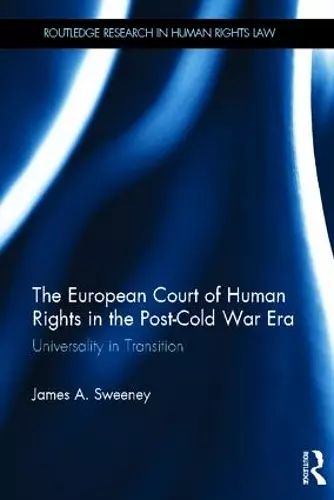The European Court of Human Rights in the Post-Cold War Era
Universality in Transition
Format:Hardback
Publisher:Taylor & Francis Ltd
Published:30th Nov '12
Currently unavailable, and unfortunately no date known when it will be back
This hardback is available in another edition too:
- Paperback£39.99(9781138809659)

The European Court of Human Rights in the Post-Cold War Era: Universality in Transition examines transitional justice from the perspective of its impact on the universality of human rights, taking the jurisprudence of the European Court of Human Rights as its detailed case study. The problem is twofold: there are questions about differences in human rights standards between transitional and non-transitional situations, and about differences between transitions.
The European Court has been a vital part of European democratic consolidation and integration for over half a century, setting meaningful standards and offering legal remedies to the individually repressed, the politically vulnerable, and the socially excluded. After their emancipation from Soviet influence in the 1990s, and with membership of the European Union in mind for many, the new democracies of Central and Eastern Europe flocked to the Convention system. The voluminous jurisprudence of the European Court of Human Rights can now give us some clear information about how an international human rights law regime can interact with transitional justice. The jurisprudence is divided between those cases concerning the human rights implications of explicitly transitional policies (such as lustration), and those that involve impacts upon specific democratic rights during the transition. The book presents a close examination of claims by states that transitional policies and priorities require a level of deference from the Strasbourg institutions. The book proposes that states’ claims for leeway from international human rights supervisory mechanisms during times of transition can be characterised not as arguments for cultural relativism, but for ‘transitional relativism’.
[Sweeney] bridges the fields of transitional justice and human rights, thus offering a highly significant contribution to both strands of academic literature… As far as the style of the book is concerned, praises are in order. Sweeney brings together numerous court cases and categorizes this less than consistent case law in a manner that is accessible to readers. - Swiss Political Science Review (Vol 20, No.1, 2014)
"Sweeney has made an important contribution to the literature on transitional justice and how human rights law can play a constructive role beyond simply setting goalposts for universal principles."
D. A. Messenger, University of Wyoming, USA, Human Rights Review (Vol 15, 2014)
ISBN: 9780415544337
Dimensions: unknown
Weight: 690g
286 pages